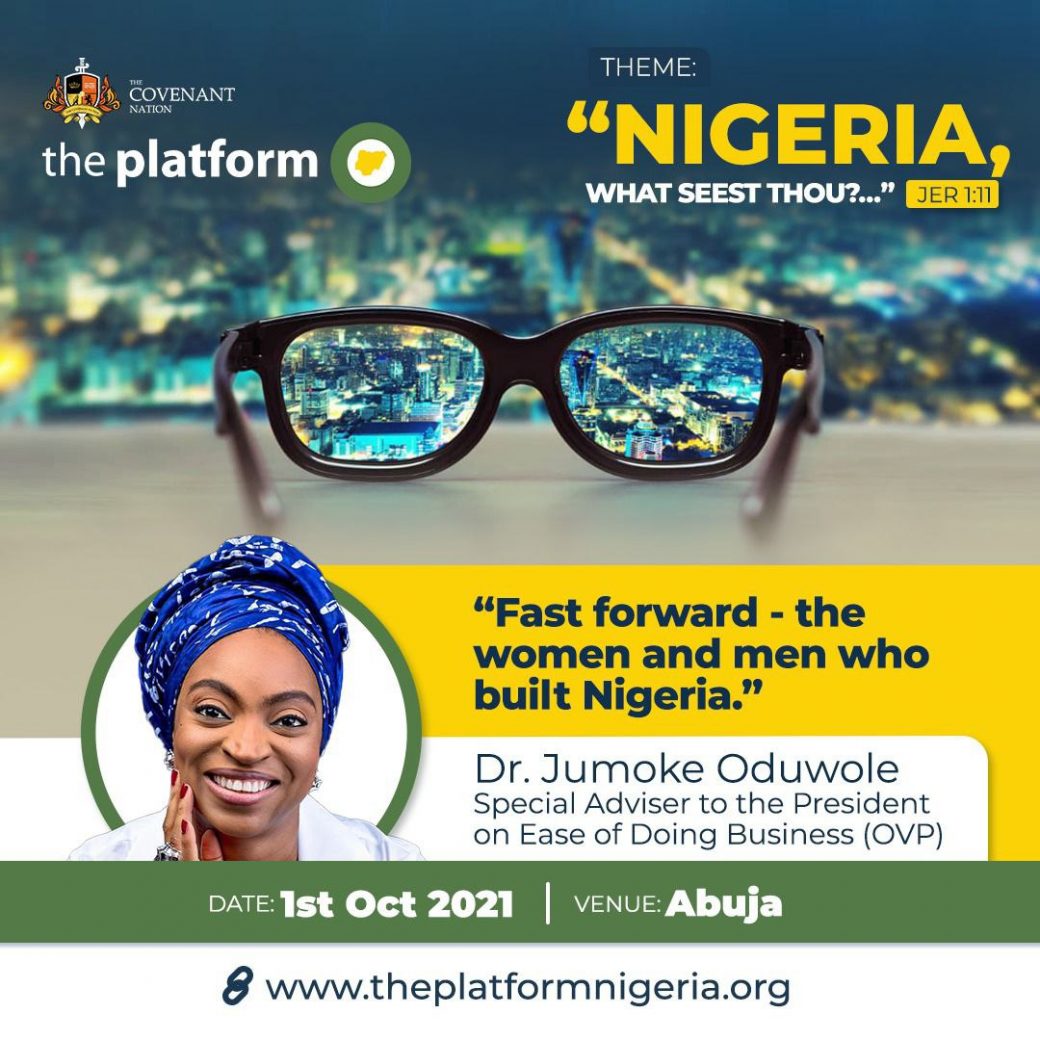Starting off with a storytelling style, Dr Jumoke Oduwole told of the dream of Nigeria and how things were in the year 2032. It all began on the 30th of September when Nigerians were preparing for their 72nd Independence Anniversary. The mood of the polity is elated and expectant. The President, a world-renowned nano-physicist turned politician became Nigeria’s first female president at the age of 45 in a landslide victory the year before. After successfully serving as the Minister of Innovation, Science and Technology since 2027 under her predecessor, her exceptional leadership capabilities and performance track record earned her the party ticket in the party’s free and fair primaries. Madam President is scheduled to deliver her state of the nation address at 9:00 am the next morning, highlights of which had been circulated in advance to domestic and international media houses. According to the financial times, the country had enjoyed nothing short of phenomenal transformation over the last decade driven by daring homegrown policies initiated by the former president and his cabinet of reformers since 2023.
Continuing her story, Dr Jumoke told of how the economic growth trajectory in the year 2032 has seen Nigeria rank at the 16th position in Global GDP, at USD 1.05Trillion as at 2031 making Nigeria the first African country to ever surpass the 1 trillion GDP mark in history. As she went deeper into this story about the dream Nigeria manifested in the year 2032, she touched on how the security issue had become a problem long resolved. Not only that, but she also told of how the adequate investment in critical infrastructure led to an increase in Nigeria’s global competitiveness and then the creation of millions of jobs. Foreign direct investment also soared as the business and regulatory environment of the country improved making Nigeria consistently rank as one of the top 3 emerging market destinations. Not leaving the transportation system out, Dr Jumoke Oduwole got to the point in her story where there were impressive metros, active inland waterways and up to 600,000km of paved road networks.
Her story of the new Nigeria progressed to the point where she gave elaborate details about human capital development indicators in health, education and housing. As she advanced in her story, we see Nigeria succeed in bidding to host the world cup and as a result, there was a significant inflow of capital into the country’s sports value chain. Then, we also see how Nigeria ranked as 38 in the world in the Science and Technology Readiness for Frontier Technology Index of 2031 having overtaken South Africa who ranked 54 three years previously. All this happened because of the policies of the then honourable minister and her colleagues. Collectively, the African region benefited from the effect of Nigeria’s economic prosperity due to her vibrant and maturing African continental free trade area which has boosted intra-African trade to 36%. Still in the story, we are told of how Nigeria’s one decade old of development has positioned her as a perfect textbook example of how an economy can turn itself around.
Having told the story to this point, Dr Jumoke went on to ask how Nigeria had succeeded when most others have failed. It was at this point that she then switched from the world of the story about the dream Nigeria of 2032 to the current reality of Nigeria. She began by sharing the content of what she described as a random WhatsApp message she received one morning, a month back. In summary, the WhatsApp message was about one person’s account of how they witnessed a scene of extortion involving the Nigerian police and a lady who was the victim. The person giving the account was unable to intervene in the scene to save the lady because he feared that he could be shot, he was already running late for his intended destination and he also decided he would mind his business. Dr Jumoke read on from this WhatsApp message and mentioned the writer observing that this negligence of action when things go wrong was the reason nations failed. Dr Jumoke ended by reading the content of that message and noted that the story was the perfect example of the bad Samaritan in all of us who looked away because of one perfect excuse or the other. Quoting a popular thought, she said, “The only thing necessary for evil to triumph is for good men and women to do nothing.” She also commented on the habit of failing to take personal responsibility when things go wrong as a common thing in the country.
Dr Jumoke referred to her work in the past 6 years as a special advisor at the Presidential Enabling Business Council Secretariat and how her team had related with and collaborated with people from all arms and levels of Government. She revealed that in the course of their stakeholders’ engagements and interactions and receiving feedback from the public, she had never met anyone who admitted to playing a negative part in the shape of Nigeria’s business climate today. By her observation, Dr Jumoke noted that no one seems to be corrupt, no one extorts money or receives bribes from businesses and no one offers bribes or inducements to circumvent the system or to even derive benefit over their competitors.
Moving on in her address, Dr Jumoke highlighted the many issues that burdened Nigeria as a country and how their number made it difficult to remember or even acknowledge the little progress that was being made. She also mentioned her fears about Nigeria’s future and the fight within her to overcome this fear. She urged Nigerians not to turn their backs on their country in her hour of need. She encouraged them to get angry about the situation of the country if they must. Using the story of Esther and Mordecai in the Bible, Dr Jumoke called on Nigerian youths using the same phrase from this story; Perhaps, you were born for a time such as this. She revealed that the transformation of Nigeria would need committed, smart and hard-working people and that this journey of transformation could start with a step. She also listed the choices she was committed to that described her patriotism.
In wrapping up, Dr Jumoke projected into the future of the dream Nigeria of 2032 and asked what the contribution of each person towards Nigeria would be in that future. She also mentioned how reforming a nation would require a number of qualities. They include integrity, serving with excellence and being a visionary reformer. She observed that what Nigeria lacked was committed people willing to implement the development plans as these plans themselves already exist. Having said all these, she put it up to each person in the audience that they are the women and men who built Nigeria.

